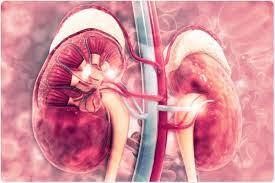A nurse is providing discharge teaching to a client who has chronic kidney disease and is receiving haemodialysis. Which of the following instructions should the nurse include in the teaching?
Eat 1 g/kg of protein per day.
Drink at least 3 L of fluid daily.
Consume foods high in potassium.
Take magnesium hydroxide for ingestion.
The Correct Answer is A
Choice A reason:
Eating 1 g/kg of protein per day is the appropriate recommendation. When providing discharge teaching to a client with chronic kidney disease (CKD) who is receiving haemodialysis, the nurse should include the instruction to eat an appropriate amount of protein, which is usually recommended at a specific daily intake based on the client's weight.
Clients with CKD often have dietary restrictions, including limiting protein intake to reduce the workload on the kidneys. However, protein intake is still necessary for maintaining muscle mass and overall health. The recommended protein intake for clients with CKD undergoing haemodialysis is typically around 1 gram of protein per kilogram of body weight per day.
Choice B reason:
Drink at least 3 L of fluid daily. Clients receiving haemodialysis typically have fluid restrictions, as impaired kidney function can lead to fluid retention and electrolyte imbalances. The specific fluid allowance will be determined by the healthcare provider based on the client's individual needs, and it may be significantly less than 3 L per day.
Choice D option
Take magnesium hydroxide for ingestion. Magnesium hydroxide is a laxative and antacid used to relieve constipation and heartburn. It is not typically prescribed for clients with chronic kidney disease, especially without proper evaluation of their kidney function and overall medical condition.
Choice C option:
C. Consume foods high in potassium.
Clients with chronic kidney disease, especially that undergoing haemodialysis, often need to restrict potassium intake. Impaired kidney function can lead to the build-up of potassium in the blood, which can be harmful. Therefore, it is essential for clients with CKD to avoid or limit foods high in potassium.

Nursing Test Bank
Naxlex Comprehensive Predictor Exams
Related Questions
Correct Answer is D
Explanation
The correct answer is d. Evaluate functioning of the suction device.
Choice D rationale:
- Prompt assessment of the suction device is crucial to determine if it's functioning properly.If the suction is inadequate,it can lead to gastric contents accumulating and potentially causing vomiting.
- Assessing the suction device first allows for timely interventionif it's not working correctly,preventing further complications and discomfort for the client.
Choice A rationale:
- Replacing the NG tube might be necessary if it's dislodged or blocked, but it shouldn't be the immediate action.
- Evaluating the suction device first can help determine if the NG tube itself is the issue or if the problem lies with the suction.
Choice B rationale:
- Providing oral hygiene care is important for comfort and to prevent aspiration, but it's not the priority intervention in this situation.
- Addressing the cause of the vomiting, which could be related to suction malfunction, takes precedence.
Choice C rationale:
- Administering an antiemetic might be helpful to control nausea and vomiting, but it doesn't address the underlying cause.
- Evaluating the suction device first is essential to ensure proper gastric decompression and prevent further vomiting episodes.
Correct Answer is D
Explanation
The correct answer is choice D. Avoid using nail polish remover around the client. Nail polish remover contains acetone, which is a flammable substance that can ignite in the presence of oxygen.
Using nail polish remover around the client can increase the risk of fire and burn injuries.
Choice A is wrong because synthetic fabrics can generate static electricity, which can also cause sparks and ignite oxygen.
The client’s bedding should be made of cotton or wool, which are natural fabrics that do not produce static electricity.
Choice B is wrong because petroleum jelly is a petroleum-based product that can react with oxygen and cause skin irritation or burns.
The client should use water-based moisturizers to soothe the mucous membranes.
Choice C is wrong because alcohol-based cleaning products are also flammable and can cause fires or explosions when exposed to oxygen.
The client should use mild soap and water to clean the equipment, and follow the manufacturer’s instructions for maintenance.
Some general safety tips for home oxygen therapy are:
- Keep away from heat and flame, such as candles, matches, lighters, stoves, fireplaces, etc.
- Do not smoke or allow others to smoke near the oxygen source
- Do not use aerosols, vapor rubs, oils, or other products that contain flammable substances near the oxygen source
- Store oxygen tanks or cylinders in a well-ventilated area away from direct sunlight and heat sources
- Secure oxygen tanks or cylinders to prevent them from falling or rolling
- Use the exact rate of oxygen prescribed by the doctor for each activity
- Check the oxygen gauge or level regularly and call the medical supply company when it is low
- Use a humidifier bottle if prescribed by the doctor to prevent dryness of the mucous membranes
- Change the nasal cannula, mask, and tubing as instructed by the medical supply company to prevent
Whether you are a student looking to ace your exams or a practicing nurse seeking to enhance your expertise , our nursing education contents will empower you with the confidence and competence to make a difference in the lives of patients and become a respected leader in the healthcare field.
Visit Naxlex, invest in your future and unlock endless possibilities with our unparalleled nursing education contents today
Report Wrong Answer on the Current Question
Do you disagree with the answer? If yes, what is your expected answer? Explain.
Kindly be descriptive with the issue you are facing.
